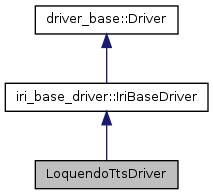IRI ROS Specific Driver Class. More...
#include <loquendo_tts_driver.h>

Public Types | |
| typedef iri_loquendo_tts::LoquendoTtsConfig | Config |
| define config type | |
Public Member Functions | |
| bool | closeDriver (void) |
| close driver | |
| void | config_update (const Config &new_cfg, uint32_t level=0) |
| config update | |
| bool | isBusy (void) |
| LoquendoTtsDriver () | |
| constructor | |
| bool | openDriver (void) |
| open driver | |
| bool | pauseSpeech (void) |
| bool | playSpeech (const std::string &msg) |
| bool | resumeSpeech (void) |
| bool | startDriver (void) |
| start driver | |
| bool | stopDriver (void) |
| stop driver | |
| bool | stopSpeech (void) |
| ~LoquendoTtsDriver () | |
| Destructor. | |
Public Attributes | |
| Config | config_ |
| config variable | |
Private Attributes | |
| CLoquendoTTS * | tts |
Detailed Description
IRI ROS Specific Driver Class.
This class inherits from the IRI Base class IriBaseDriver, which provides the guidelines to implement any specific driver. The IriBaseDriver class offers an easy framework to integrate functional drivers implemented in C++ with the ROS driver structure. ROS driver_base state transitions are already managed by IriBaseDriver.
The LoquendoTtsDriver class must implement all specific driver requirements to safetely open, close, run and stop the driver at any time. It also must guarantee an accessible interface for all driver's parameters.
The LoquendoTtsConfig.cfg needs to be filled up with those parameters suitable to be changed dynamically by the ROS dyanmic reconfigure application. The implementation of the CIriNode class will manage those parameters through methods like postNodeOpenHook() and reconfigureNodeHook().
Definition at line 53 of file loquendo_tts_driver.h.
Member Typedef Documentation
| typedef iri_loquendo_tts::LoquendoTtsConfig LoquendoTtsDriver::Config |
define config type
Define a Config type with the LoquendoTtsConfig. All driver implementations will then use the same variable type Config.
Definition at line 66 of file loquendo_tts_driver.h.
Constructor & Destructor Documentation
| LoquendoTtsDriver::LoquendoTtsDriver | ( | void | ) |
constructor
In this constructor parameters related to the specific driver can be initalized. Those parameters can be also set in the openDriver() function. Attributes from the main node driver class IriBaseDriver such as loop_rate, may be also overload here.
Definition at line 6 of file loquendo_tts_driver.cpp.
Destructor.
This destructor is called when the object is about to be destroyed.
Definition at line 82 of file loquendo_tts_driver.cpp.
Member Function Documentation
| bool LoquendoTtsDriver::closeDriver | ( | void | ) | [virtual] |
close driver
In this function, the driver must be closed. Variables related to the driver state must also be taken into account. This function is automatically called by IriBaseDriver::doClose(), an state transition is performed if return value equals true.
- Returns:
- bool successful
Implements iri_base_driver::IriBaseDriver.
Definition at line 31 of file loquendo_tts_driver.cpp.
| void LoquendoTtsDriver::config_update | ( | const Config & | new_cfg, |
| uint32_t | level = 0 |
||
| ) |
config update
In this function the driver parameters must be updated with the input config variable. Then the new configuration state will be stored in the Config attribute.
- Parameters:
-
new_cfg the new driver configuration state level level in which the update is taken place
Definition at line 47 of file loquendo_tts_driver.cpp.
| bool LoquendoTtsDriver::isBusy | ( | void | ) |
Definition at line 143 of file loquendo_tts_driver.cpp.
| bool LoquendoTtsDriver::openDriver | ( | void | ) | [virtual] |
open driver
In this function, the driver must be openned. Openning errors must be taken into account. This function is automatically called by IriBaseDriver::doOpen(), an state transition is performed if return value equals true.
- Returns:
- bool successful
Implements iri_base_driver::IriBaseDriver.
Definition at line 12 of file loquendo_tts_driver.cpp.
| bool LoquendoTtsDriver::pauseSpeech | ( | void | ) |
Definition at line 115 of file loquendo_tts_driver.cpp.
| bool LoquendoTtsDriver::playSpeech | ( | const std::string & | msg | ) |
Definition at line 87 of file loquendo_tts_driver.cpp.
| bool LoquendoTtsDriver::resumeSpeech | ( | void | ) |
Definition at line 129 of file loquendo_tts_driver.cpp.
| bool LoquendoTtsDriver::startDriver | ( | void | ) | [virtual] |
start driver
After this function, the driver and its thread will be started. The driver and related variables should be properly setup. This function is automatically called by IriBaseDriver::doStart(), an state transition is performed if return value equals true.
- Returns:
- bool successful
Implements iri_base_driver::IriBaseDriver.
Definition at line 37 of file loquendo_tts_driver.cpp.
| bool LoquendoTtsDriver::stopDriver | ( | void | ) | [virtual] |
stop driver
After this function, the driver's thread will stop its execution. The driver and related variables should be properly setup. This function is automatically called by IriBaseDriver::doStop(), an state transition is performed if return value equals true.
- Returns:
- bool successful
Implements iri_base_driver::IriBaseDriver.
Definition at line 42 of file loquendo_tts_driver.cpp.
| bool LoquendoTtsDriver::stopSpeech | ( | void | ) |
Definition at line 101 of file loquendo_tts_driver.cpp.
Member Data Documentation
config variable
This variable has all the driver parameters defined in the cfg config file. Is updated everytime function config_update() is called.
Definition at line 74 of file loquendo_tts_driver.h.
CLoquendoTTS* LoquendoTtsDriver::tts [private] |
Definition at line 57 of file loquendo_tts_driver.h.
The documentation for this class was generated from the following files: